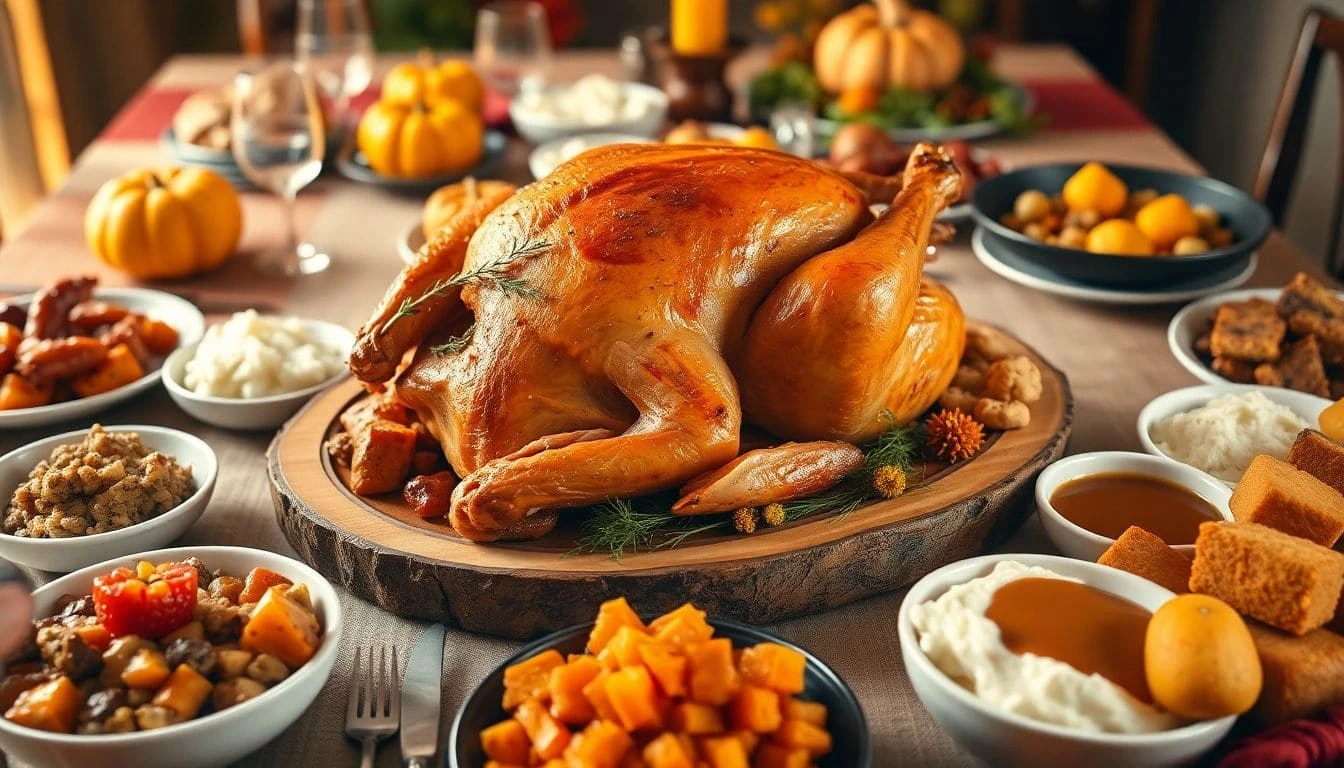Thanksgiving is a time of gathering, gratitude, and of course, great food. Each year, millions of Americans celebrate this cherished holiday with a huge feast. In fact, a survey revealed that over 90% of Americans eat turkey on Thanksgiving. Traditional foods play a big role in this holiday, showing how they have evolved over time. This article will explore the history, significance, and preparation of key Thanksgiving dishes.
The Star of the Show: Roasted Turkey
A History of Turkey on Thanksgiving Tables
Turkey has become the centerpiece of many Thanksgiving traditional foods dinners. The tradition likely started with the early settlers in the 1620s. They celebrated their first harvest with a feast that may have featured wild fowl, including turkeys. Today, Americans consume roughly 46 million turkeys each year during Thanksgiving, making it the most popular meat choice for this holiday.
Mastering the Roast
Perfectly roasted turkey is an art. The most common methods include:
- Oven Roasting: Preheat your oven to 325°F. A good rule is 13-15 minutes per pound.
- Deep Frying: This method can reduce cooking time significantly, but it requires careful safety precautions.
- Smoking: It adds a unique flavor to the turkey. Keep the temperature low and slow for the best results.
For a successful roast, make sure to check the internal temperature, aiming for at least 165°F. Resting the turkey for 20-30 minutes before carving helps retain juices.
Beyond the Bird
Not everyone loves turkey. Alternatives like ham, roast beef, or even vegetarian options such as stuffed squash are great substitutes. Exploring these options can bring variety to your feast.
Stuffing: The Heart of the Meal
A Diverse World of Stuffings
Stuffing has become a Thanksgiving traditional foods staple, and recipes vary across the country. Popular types include:
- Sourdough: Tangy flavor with a chewy texture.
- Cornbread: Sweet and crumbly, especially loved in the South.
- Wild Rice: A nutty, hearty alternative.
Many families have their own special secret recipes passed down through generations.
Mastering Stuffing Techniques
To create a delicious stuffing, consider these tips:
- Use a mix of bread types for texture.
- Sauté vegetables like onion and celery for depth of flavor.
- Add herbs like rosemary and sage to enhance taste.
Cooking stuffing inside the turkey is a classic approach, but preparing it separately ensures even cooking.
Stuffing Alternatives
For those seeking healthier options, consider:
- Quinoa Stuffing: High in protein and gluten-free.
- Vegetable Stuffing: Use seasonal veggies as the base for a fresh take.
Side Dishes: A Symphony of Flavors
Mashed Potatoes
Mashed potatoes have been a part of Thanksgiving since the late 1800s. For perfect mashed potatoes, use starchy potatoes like Russets. Cream or butter can be added for richness. Don’t forget creative twists like sweet potato mash with cinnamon and brown sugar.
Green Bean Casserole
Green bean casserole became popular with the campbells in the 1950s. This dish combines green beans, cream of mushroom soup, and crispy onion rings, making it comforting and nostalgic. It’s often a favorite among guests.
Cranberry Sauce
Cranberry sauce is a must-have. It can be made fresh with whole berries or from a can for convenience. Whole berry sauce adds texture, while jellied provides sweetness without chunks. This tart addition balances the richness of other dishes.
The Sweet Finale: Pies and Desserts
Pumpkin Pie: A Thanksgiving Classic
Pumpkin pie truly embodies Thanksgiving traditional foods. Its origins trace back to early American colonists. Nutritionally, pumpkin is low in calories and high in fiber. In 2022, sales of pumpkin pie reached nearly $200 million.
Apple Pie: A Contender for the Throne
Apple pie, often described as America’s favorite dessert, has a history tied to European settlers. Variations include classic cinnamon spice or caramel apple. While pumpkin pie may hold the crown, apple pie is a close second, loved by many.
Beyond the Classics
Don’t overlook other desserts like pecan pie or sweet potato pie. Each offers a unique taste and cultural significance, enriching the dessert table.
Modern Twists on Tradition
Vegetarian and Vegan Thanksgiving
More people are looking for vegetarian and vegan options. Dishes like lentil loaf, stuffed peppers, or mushroom Wellington create a satisfying experience without meat. Recipes are available that cater to these diets.
Gluten-Free and Allergy-Friendly Options
Accommodating dietary restrictions is easy with the right recipes. Gluten-free stuffing made with gluten-free bread or cauliflower mash allows everyone to enjoy the meal without worry.
Global Influences on Thanksgiving Food
Today’s Thanksgiving traditional foods influenced by various cultures. Adding dishes like tamales, curry, or sushi showcases the rich diversity of ingredients and flavors.
Balancing Tradition and Health
While Thanksgiving is a time for indulgence, you can enjoy traditional foods mindfully. For tips on how to balance festive eating with wellness goals, explore our article on Weight Loss.
Conclusion
Thanksgiving is about more than just food; it’s about connection and gratitude. We covered the significance of turkey, stuffing, side dishes, and desserts, alongside modern twists on these traditions. Each dish tells a story that brings families together. As you plan your Thanksgiving traditional foods feast, remember to embrace tradition while adding your unique flair. Celebrate with delicious food that reflects your family’s history, and enjoy the moments shared around the table.





